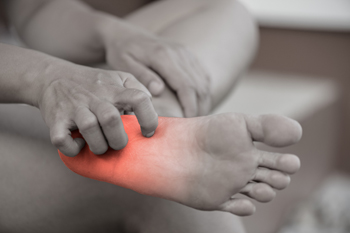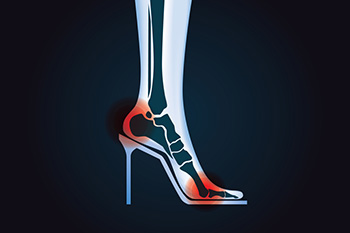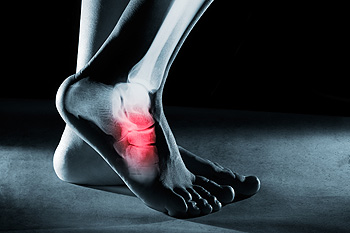Items filtered by date: July 2022
How Peripheral Neuropathy Affects Elderly People

Peripheral neuropathy, or neuropathy, is a term for nerve damage to the peripheral nervous system. These are nerves that are outside of the brain and spinal cord. Peripheral neuropathy can create various symptoms which may impair a person’s balance and their perception of their body and its movement. These symptoms include numbness, pain, and weakness in the feet. Older adults are more prone to developing peripheral neuropathy as a complication of diabetes, which can cause them to have foot drop, difficulty walking up stairs, rising out of their chairs, and standing up from a crouching position. All of this can increase the elderly person’s already heightened risk of falls. If you or someone you love is experiencing any of the symptoms mentioned here, it is suggested that you make an appointment with a podiatrist for a full examination and evaluation.
Neuropathy
Neuropathy can be a potentially serious condition, especially if it is left undiagnosed. If you have any concerns that you may be experiencing nerve loss in your feet, consult with one of our podiatrists from Pennsylvania. Our doctors will assess your condition and provide you with quality foot and ankle treatment for neuropathy.
What Is Neuropathy?
Neuropathy is a condition that leads to damage to the nerves in the body. Peripheral neuropathy, or neuropathy that affects your peripheral nervous system, usually occurs in the feet. Neuropathy can be triggered by a number of different causes. Such causes include diabetes, infections, cancers, disorders, and toxic substances.
Symptoms of Neuropathy Include:
- Numbness
- Sensation loss
- Prickling and tingling sensations
- Throbbing, freezing, burning pains
- Muscle weakness
Those with diabetes are at serious risk due to being unable to feel an ulcer on their feet. Diabetics usually also suffer from poor blood circulation. This can lead to the wound not healing, infections occurring, and the limb may have to be amputated.
Treatment
To treat neuropathy in the foot, podiatrists will first diagnose the cause of the neuropathy. Figuring out the underlying cause of the neuropathy will allow the podiatrist to prescribe the best treatment, whether it be caused by diabetes, toxic substance exposure, infection, etc. If the nerve has not died, then it’s possible that sensation may be able to return to the foot.
Pain medication may be issued for pain. Electrical nerve stimulation can be used to stimulate nerves. If the neuropathy is caused from pressure on the nerves, then surgery may be necessary.
If you have any questions, please feel free to contact one of our offices located in Plymouth Meeting and Ambler, PA . We offer the newest diagnostic and treatment technologies for all your foot care needs.
Effective Foot Care Methods for High Heel Wearers

Many foot problems can occur when high heels are frequently worn. It is important to protect the feet, and there are specific methods that can be implemented, which may make the feet feel better. When the day is over, and the high heels come off, many women walk barefoot to stretch their foot muscles out. Excess friction from wearing high heels may cause a blister to form, and it is beneficial to cover it with a protective bandage. Popping the blister may prolong the healing, and covering it can be helpful in resisting the urge to pop it. When the feet are soaked in a tub of warm water, it soothes the muscles, and this can be followed by applying a good moisturizer. Foot yoga can be beneficial to practice as often as possible, and many women find this to be effective in strengthening the entire foot. Pampering the feet always feels good, and getting a pedicure is helpful in maintaining proper skin conditions. There are different types of high heels the feet can feel comfortable in, and it is suggested that you consult with a podiatrist who can provide you with beneficial information about what type of high heels to wear.
High heels have a history of causing foot and ankle problems. If you have any concerns about your feet or ankles, contact one of our podiatrists from Pennsylvania. Our doctors can provide the care you need to keep you pain-free and on your feet.
Effects of High Heels on the Feet
High heels are popular shoes among women because of their many styles and societal appeal. Despite this, high heels can still cause many health problems if worn too frequently.
Which Parts of My Body Will Be Affected by High Heels?
- Ankle Joints
- Achilles Tendon – May shorten and stiffen with prolonged wear
- Balls of the Feet
- Knees – Heels cause the knees to bend constantly, creating stress on them
- Back – They decrease the spine’s ability to absorb shock, which may lead to back pain. The vertebrae of the lower back may compress.
What Kinds of Foot Problems Can Develop from Wearing High Heels?
- Corns
- Calluses
- Hammertoe
- Bunions
- Morton’s Neuroma
- Plantar Fasciitis
How Can I Still Wear High Heels and Maintain Foot Health?
If you want to wear high heeled shoes, make sure that you are not wearing them every day, as this will help prevent long term physical problems. Try wearing thicker heels as opposed to stilettos to distribute weight more evenly across the feet. Always make sure you are wearing the proper shoes for the right occasion, such as sneakers for exercising. If you walk to work, try carrying your heels with you and changing into them once you arrive at work. Adding inserts to your heels can help cushion your feet and absorb shock. Full foot inserts or metatarsal pads are available.
If you have any questions please feel free to contact one of our offices located in Plymouth Meeting and Ambler, PA . We offer the newest diagnostic and treatment technologies for all your foot and ankle needs.
Why Live with Pain and Numbness in Your Feet?
How Do Stress Fractures Occur?

A stress fracture is a hairline fracture in the foot. It develops gradually and results from overuse. It is common among people who participate in jumping and running activities, and it can cause pain and discomfort. A stress fracture occurs when the muscles are not able to handle the impact of running and this can cause the bone to absorb pressure and break. Runners may experience this condition from increasing their mileage and speed too quickly. Time is often taken off from the chosen activity so proper healing can take place. Additionally, it is important to warm up and cool down before beginning any exercise routine and this may help prevent stress fractures. Mild relief can be found when the affected foot is frequently elevated and many people wear a protective boot or cast. If you have endured a stress fracture, it is strongly advised that you consult with a podiatrist who can treat this condition and possibly fit you with custom-made orthotics which may accelerate the healing process.
Activities where too much pressure is put on the feet can cause stress fractures. To learn more, contact one of our podiatrists from Pennsylvania. Our doctors can provide the care you need to keep your pain free and on your feet.
Dealing with Stress Fractures of the Foot and Ankle
Stress fractures occur in the foot and ankle when muscles in these areas weaken from too much or too little use. The feet and ankles then lose support when walking or running from the impact of the ground. Since there is no protection, the bones receive the full impact of each step. Stress on the feet can cause cracks to form in the bones, thus creating stress fractures.
What Are Stress Fractures?
Stress fractures occur frequently in individuals whose daily activities cause great impact on the feet and ankles. Stress factors are most common among:
- Runners
- People affected with Osteoporosis
- Tennis or basketball players
- Gymnasts
- High impact workouts
Symptoms
Pain from the fractures occur in the area of the fractures and can be constant or intermittent. It will often cause sharp or dull pain with swelling and tenderness. Engaging in any kind of activity which involves high impact will aggravate pain.
If you have any questions please feel free to contact one of our offices located in Plymouth Meeting and Ambler, PA . We offer the newest diagnostic and treatment technologies for all your foot and ankle needs.
Pain in Toes When Running

Pain in one’s toes can interfere with a running routine. Toe injuries while running can heal in a short amount of time with care and rest, but a more serious problem with a toe may derail a runner’s routine and set them back for longer than comfortable. Common toe problems in runners range from mild blisters to more serious hammertoes and stress fractures. A blister is caused by friction between the skin and shoes or socks. The outer layer of the skin separates from the inner layer and fills with lymph fluid. These are most common when a runner wears new shoes for the first time or increases their mileage. A hammertoe causes one or more of the smaller toes to bend upward. A corn or callus can develop on top of such a toe causing it to rub against shoes and the toe joint(s) can become swollen and painful. Stress fractures are common in teen athletes and are a result of overdoing runs. If a toenail becomes painful and begins to blacken, it might be runner’s toe. This is when the nail is under pressure because a shoe is too tight, or the toe is impacted repeatedly while running. Pressure causes friction between the nail and surrounding tissue. Fluid accumulates and blood capillaries break, causing the toenail to change color and pain to come on. The blackened toenail will eventually fall off, but this could take months. If you are a runner and you have toe pain, consult with a podiatrist who can diagnose the problem and determine how to best treat it.
Sports related foot and ankle injuries require proper treatment before players can go back to their regular routines. For more information, contact one of our podiatrists of Pennsylvania. Our doctors can provide the care you need to keep you pain-free and on your feet.
Sports Related Foot and Ankle Injuries
Foot and ankle injuries are a common occurrence when it comes to athletes of any sport. While many athletes dismiss the initial aches and pains, the truth is that ignoring potential foot and ankle injuries can lead to serious problems. As athletes continue to place pressure and strain the area further, a mild injury can turn into something as serious as a rupture and may lead to a permanent disability. There are many factors that contribute to sports related foot and ankle injuries, which include failure to warm up properly, not providing support or wearing bad footwear. Common injuries and conditions athletes face, including:
- Plantar Fasciitis
- Plantar Fasciosis
- Achilles Tendinitis
- Achilles Tendon Rupture
- Ankle Sprains
Sports related injuries are commonly treated using the RICE method. This includes rest, applying ice to the injured area, compression and elevating the ankle. More serious sprains and injuries may require surgery, which could include arthroscopic and reconstructive surgery. Rehabilitation and therapy may also be required in order to get any recovering athlete to become fully functional again. Any unusual aches and pains an athlete sustains must be evaluated by a licensed, reputable medical professional.
If you have any questions please feel free to contact one of our offices located in Plymouth Meeting and Ambler, PA . We offer the newest diagnostic and treatment technologies for all your foot and ankle needs.

